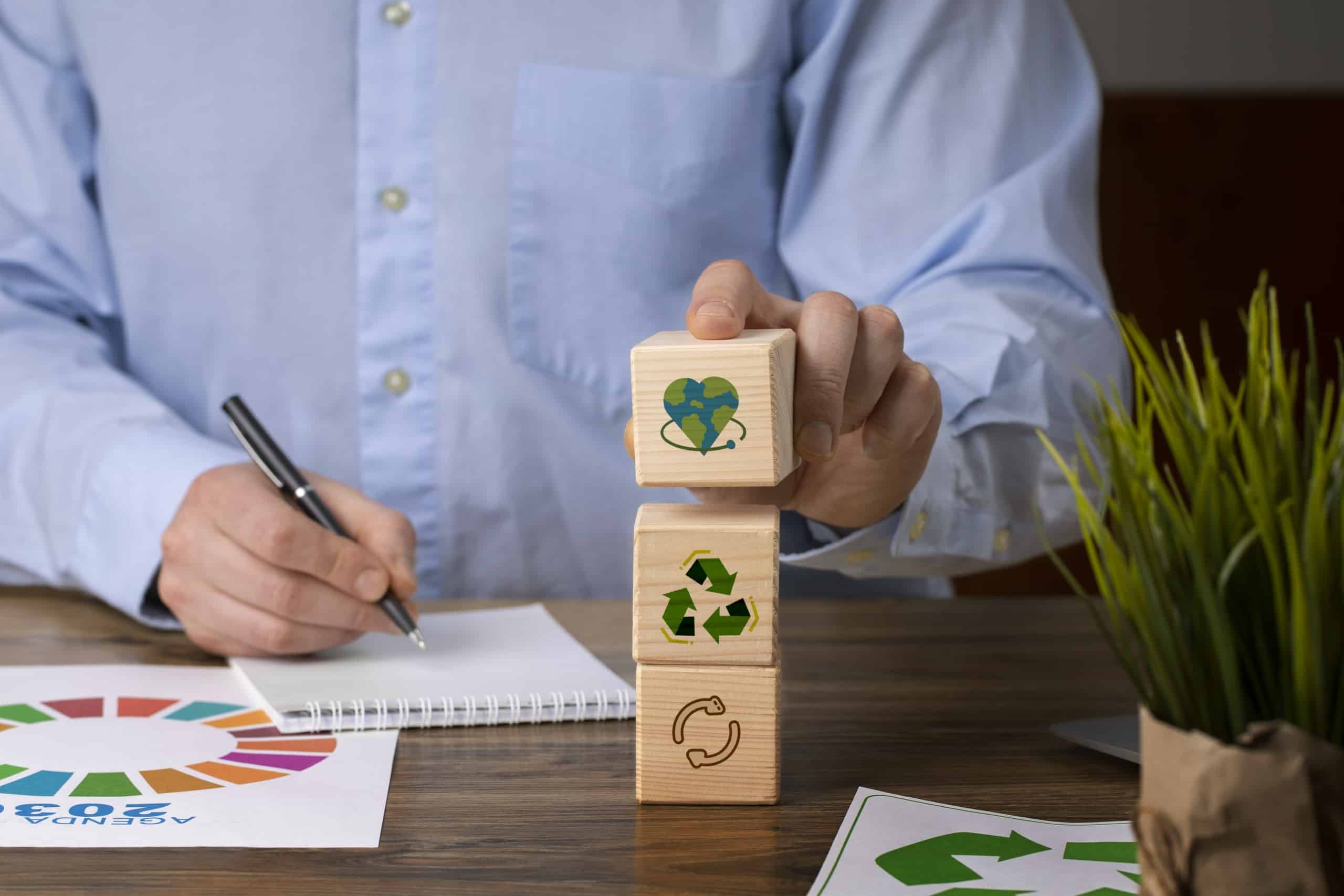The Push for Sustainability
The increasing apprehension over the ecological consequences of wet wipes is a substantial catalyst for the promotion of sustainability in the business. Historically, a significant number of wet wipes have been manufactured using synthetic fibers like polyester and polypropylene, which have a low rate of decomposition and hence contribute to environmental contamination. Improper disposal of these wipes may result in their presence in streams and seas, causing significant harm to marine life and ecosystems. Moreover, traditional wet wipes often include plastic resins and chemical additives that worsen their impact on the environment. These issues have increased awareness and the need for sustainable solutions that reduce ecological damage.
Regulatory authorities and governments globally are also crucially involved in fostering sustainability in the wet wipes business. Recently, laws have been implemented to prohibit or limit the use of certain substances and compounds in wet wipes, aiming to decrease their ecological consequences. The European Union’s Single-Use Plastics Directive seeks to reduce the use of single-use plastic goods, such as wet wipes, by promoting the creation of biodegradable and compostable alternatives. These rules motivate producers to engage in innovation and allocate resources to research and development to produce environmentally friendly goods that meet these criteria.
Both consumer knowledge and preferences play crucial roles in driving sustainability in the wet wipes industry. Present-day customers possess a higher level of knowledge and awareness on many matters and exhibit a greater concern for the environment compared to previous generations. They deliberately search for items that are in line with their ideals, choosing businesses that show a dedication to environmental responsibility. Companies are being compelled to pursue sustainable practices in all aspects of their operations, including sourcing raw materials, packaging, and distribution, due to a change in customer behavior. Wet wipes manufacturers that adopt sustainability practices may not only acquire a devoted consumer base but also distinguish themselves in a competitive market by emphasizing their environmentally-friendly qualifications.
The wet wipes business has also embraced circular economy ideas as part of the drive towards sustainability. A circular economy seeks to eradicate waste and advance the perpetual use of resources by completing the cycle in product lifecycles. This entails the development of goods with a focus on durability, the capacity to be repaired, and the potential for recycling. Additionally, it includes the establishment of systems for the collection and recycling of spent materials. Regarding wet wipes, this may include endeavors such as creating wipes that are readily biodegradable or recyclable, or establishing systems to facilitate responsible disposal. Through the adoption of circular economy principles, the wet wipes business may decrease its dependence on new resources and effectively limit the amount of trash generated, so making a significant contribution towards a more environmentally friendly and sustainable future.
Ultimately, the urge for sustainability in the wet wipes sector stems from a confluence of factors including environmental considerations, legal obligations, customer expectations, and the embrace of circular economy ideas. Given the ongoing evolution of the industry, wet wipes manufacturers must place sustainability at the forefront of their product development and business operations. By taking these actions, individuals may minimize their ecological footprint, fulfill the demands of environmentally aware customers, and actively contribute to a more sustainable earth for future progeny. The pursuit of sustainability presents both a duty and a chance for the wet wipes sector to foster innovation and take the lead in establishing a more sustainable and accountable business.
Innovative Materials in Wet Wipes
The wet wipes sector is now undergoing a significant transformation in material science as it actively explores sustainable substitutes for conventional synthetic fibers. The main driving force behind this trend is the need to minimize environmental damage and satisfy increasing customer expectations for environmentally friendly goods. Consequently, wet wipes manufacturers are investigating various cutting-edge materials that provide both practicality and environmental friendliness. These materials not only tackle environmental problems but also provide additional advantages, such as enhanced performance and fewer ecological footprints.
Biodegradable Fibers
Biodegradable fibers are a very promising advancement in sustainable wet wipes. Materials such as cellulose, bamboo, and cotton are growing in popularity since they are naturally biodegradable and provide environmental advantages. Cellulose, obtained from wood pulp, is a sustainable resource that readily decomposes in the environment, making it a perfect option for environmentally friendly wet wipes. Bamboo, a biodegradable alternative, is praised for its fast growth and minimum resource needs. Bamboo-derived wipes are both biodegradable and exhibit inherent antibacterial qualities, providing consumers with further advantages. Cotton, a renowned organic fabric, has both a gentle texture and a high capacity for soaking up liquids, making it a widely favored option for eco-friendly wet wipes. These biodegradable fibers contribute to the reduction of landfill trash and the mitigation of the environmental consequences associated with wet wipes, making them a favored option for environmentally aware customers.
Compostable Nonwovens
Compostable nonwoven materials are becoming more important in the effort to create environmentally friendly wet wipes. Compostable nonwovens, in contrast to conventional nonwovens often composed of synthetic materials, are specifically engineered to break down in composting environments, transforming into soil that is abundant in nutrients. These materials are often produced using plant-based resources, such as polylactic acid (PLA), which is obtained from renewable sources like maize starch. PLA-based nonwovens have the advantageous qualities of sustainability and performance, since they may be specifically designed to deliver the desired attributes of softness, strength, and absorbency required for efficient wet wipes. Manufacturers may greatly diminish the environmental consequences of their goods and contribute to the circular economy by using biodegradable nonwovens, which encourage waste reduction and the retrieval of resources.
Water-Soluble Formulations
Water-soluble wipes are a novel remedy for the issue of wipes obstructing sewage systems and adding to environmental contamination. These wipes are specifically engineered to fast dissolve when coming into touch with water, hence decreasing the likelihood of blockages and diminishing their ecological footprint. Water-soluble formulations use sophisticated material engineering techniques to maintain the efficacy and durability of the wipes, while also being ecologically sustainable. This invention is especially beneficial in metropolitan settings, where the incorrect disposal of wet wipes may result in substantial infrastructural difficulties. Water-soluble wipes provide a practical and environmentally friendly option that meets the demands of consumers and addresses environmental issues. This innovation has the potential to create a more sustainable future in the wet wipes business.
Regenerative Agriculture Materials
Some wet wipes manufacturers are further improving the sustainability of their wet wipes by including fibers sourced from regenerative agricultural techniques, in addition to employing biodegradable and compostable components. Regenerative agriculture is a farming approach that aims to enhance soil health, promote biodiversity, and improve ecosystem services, resulting in more sustainable agricultural methods. Manufacturers may promote ecologically beneficial practices and produce eco-friendly wet wipes by using fibers sourced from crops cultivated using regenerative techniques. This strategy not only minimizes the ecological footprint of wet wipes but also aids in the conservation of natural resources for future generations. Companies may showcase their dedication to environmental stewardship and advance a more sustainable supply chain by using regenerative agricultural components in their goods.
To summarize, the ongoing exploration of novel materials in the wet wipes business is revolutionizing the manufacturing and use of these goods. Biodegradable fibers, compostable nonwovens, water-soluble formulations, and regenerative agricultural materials are leading the way in this revolution, providing sustainable options to replace conventional synthetic materials. As the business progresses, these advancements will be essential in diminishing the ecological footprint of wet wipes and satisfying the needs of environmentally aware customers. Wet wipes manufacturers may take the lead in developing a more sustainable and ethical wet wipes sector by adopting these novel materials.
Advancements in Manufacturing Processes
The wet wipes sector is not only prioritizing novel materials but also making substantial progress in improving its production methods to achieve sustainability. These innovations strive to minimize the ecological footprint of manufacturing, optimize the use of resources, and satisfy the increasing customer need for environmentally sustainable goods. Wet wipes manufacturers are using advanced technology and sustainable techniques to produce wet wipes more responsibly and efficiently.
An essential aspect of sustainable manufacturing is the minimization of energy use. Conventional production methods for wet wipes often entail substantial energy consumption, which leads to the release of greenhouse gases and environmental deterioration. In response to this issue, corporations are allocating resources toward the implementation of energy-efficient technologies and machines, which aim to reduce energy consumption at every stage of the manufacturing process. For example, the use of sustainable energy sources, such as solar or wind power, is becoming common in industrial plants. In addition, the use of energy-efficient equipment and automation technologies may streamline production processes, resulting in reduced energy waste and improved overall efficiency. Wet wipes manufacturers may make a substantial contribution to a more sustainable sector by giving priority to energy efficiency, which will result in a large reduction in their carbon footprint.
Water is an essential resource in the creation of wet wipes since it is utilized for both the manufacturing procedures and the formulation of the wipes themselves. To alleviate water shortages and minimize environmental harm, wet wipes manufacturers are using water conservation measures and recycling technologies. There is a growing prevalence of closed-loop water systems, which enable enterprises to recycle and reuse water inside their buildings. This method not only preserves water but also reduces the release of effluent into the environment. Moreover, progress in water filtration and treatment technology allows enterprises to cleanse and recycle water, reducing water wastage and fostering sustainability. The wet wipes business may contribute to the preservation of water for future generations by employing water conservation practices.
Reducing waste and optimizing resource use are crucial elements of sustainable manufacturing procedures. Companies are implementing waste reduction strategies that prioritize the optimization of material use, recycling, and the reuse of manufacturing by-products. Wet wipes manufacturers are now investigating methods to reuse waste materials and transform them into useful assets, such as secondary goods or sources of energy. The integration of lean manufacturing concepts into production processes aims to optimize efficiency and limit resource consumption by focusing on waste reduction and continual improvement. Wet wipes manufacturers may minimize their environmental footprint and establish a more sustainable manufacturing system by lowering waste and enhancing resource efficiency.
The use of automation and smart manufacturing technology is transforming the wet wipes sector by improving production efficiency and sustainability. Automation enables meticulous regulation of industrial processes, minimizing inaccuracies and inefficiencies while maximizing resource use. Smart manufacturing technologies, such as the Internet of Things (IoT) and artificial intelligence (AI), provide instantaneous monitoring and analysis of data, empowering producers to make well-informed choices that enhance efficiency and mitigate environmental effects. IoT sensors can monitor energy use, water usage, and manufacturing outputs. This allows wet wipes manufacturers to discover areas that need improvement and take appropriate remedial measures. Through the use of automation and smart production techniques, the wet wipes business may attain elevated levels of sustainability and operational efficiency.
Companies are prioritizing sustainable packaging options for wet wipes, alongside their efforts to enhance production processes. Conventional packing materials, often composed of plastic, lead to environmental contamination and generate waste. In response to this issue, wet wipes manufacturers are actively investigating environmentally friendly packaging options, including biodegradable films, recycled materials, and reusable containers. Sustainable packaging not only minimizes the ecological footprint of wet wipes but also corresponds to customer demands for environmentally conscious goods. Wet wipes manufacturers may improve the overall sustainability of their goods and satisfy the demands of environmentally aware customers by giving priority to sustainable packaging.
Advancements in manufacturing methods are vital in facilitating the wet wipes industry’s shift towards sustainability. Energy-efficient manufacturing, water conservation, waste reduction, automation, and sustainable packaging solutions are the primary areas of emphasis that contribute to a more responsible and efficient production system. Wet wipes manufacturers may minimize their environmental footprint, optimize resource use, and foster a sustainable future for the wet wipes business by adopting these technological innovations. As the sector progresses, these advancements will be crucial in satisfying the increasing need for environmentally friendly goods and aiding worldwide initiatives to preserve the environment.
The Role of Certifications
Certifications are crucial in the wet wipes market as they serve to advance sustainability, guarantee product excellence, and foster customer confidence. Certifications provide producers a vital framework to showcase their dedication to environmental and social responsibility, as the demand for eco-friendly goods steadily increases. Wet wipes manufacturers may distinguish their goods in a competitive market, fulfill legal obligations, and improve their brand recognition by following strict standards and acquiring recognized certifications.
Certifications function as a reference point for environmental criteria in the wet wipes business, guiding producers in adopting sustainable methods and materials. Certifications such as OEKO-TEX®, GOTS (Global Organic Textile Standard), and FSC (Forest Stewardship Council) are highly acknowledged for their rigorous standards and emphasis on environmental sustainability. These certifications guarantee that items are manufactured using environmentally friendly components, such as organic cotton or sustainably sourced wood pulp, and that manufacturing techniques are designed to limit harm to the environment. By acquiring these certificates, producers can guarantee customers that their goods adhere to rigorous environmental criteria and actively support the conservation of natural resources.
The OEKO-TEX® certification specifically targets textile goods that are devoid of any detrimental ingredients, guaranteeing the well-being of customers and the environment. The GOTS certification is a widely acknowledged worldwide standard for organic textiles. It covers the full process of producing organic textiles, starting with the collection of raw materials to the ecologically and socially responsible manufacture. The FSC accreditation guarantees that the wood-based components used in wet wipes are obtained from forests that are managed sustainably, therefore supporting biodiversity and sustainable forestry methods. These certifications serve to validate the environmental attributes of wet wipes and also promote the adoption of sustainable practices by manufacturers across all aspects of their business.
Certifications in the wet wipes business not only focus on environmental sustainability but also prioritize social responsibility. Several certification programs include standards about equitable labor practices, occupational safety, and community involvement. By complying with these guidelines, wet wipes manufacturers may guarantee that their goods are manufactured under ethical circumstances, upholding the rights and welfare of workers engaged in the supply chain. Consumers are placing more significance on social responsibility, as they want items that are in line with their beliefs and promote ethical corporate practices.
Certifications such as Fair Trade and SA8000 (Social Accountability) establish standards for enterprises to guarantee equitable remuneration, secure working environments, and the protection of workers’ rights at every stage of the manufacturing process. These certifications require that organizations undertake periodic audits and examinations to confirm their adherence to social responsibility criteria. Wet wipes manufacturers may showcase their dedication to ethical business practices and bolster their position as socially responsible entities by acquiring these certificates.
Certifications are essential for establishing customer trust and confidence in wet wipes goods. In a time when customers are becoming more skeptical of greenwashing and deceptive environmental statements, certifications provide an impartial confirmation of a product’s sustainability qualifications. Manufacturers may instill confidence in customers by prominently displaying certified labels on their goods, indicating that their products have undergone thorough testing and comply with well-established environmental and social criteria.
Furthermore, certifications assist customers in making well-informed purchase choices by offering openness and clarity on a product’s sustainable characteristics. Certification labels often include comprehensive information on the materials used, manufacturing methods employed, and ecological consequences, so empowering customers to choose items that are in line with their own beliefs and tastes. This level of openness not only cultivates confidence between wet wipes manufacturers and customers but also promotes brand loyalty and customer contentment.
Certifications are crucial in assisting wet wipes manufacturers to comply with regulatory requirements and industry standards. As governments and regulatory agencies throughout the globe implement more stringent laws for environmental sustainability and product safety, certifications provide a helpful structure for ensuring compliance. Wet wipes manufacturers may guarantee that their goods comply with regulatory requirements and avoid possible fines or market limitations by following certification standards.
One instance is the European Union’s Ecolabel, which is a certification initiative that establishes environmental criteria for items available in the EU. Products that display the Ecolabel must adhere to precise standards on environmental performance, safety, and quality, guaranteeing conformity with EU rules. In the United States, the USDA Organic certification sets guidelines for organic goods, including those in the wet wipes business, to ensure they meet the criteria for organic labeling. Manufacturers may effectively traverse complex regulatory environments and secure entry into international markets by acquiring these certifications.
Certifications may stimulate innovation in the wet wipes market by motivating wet wipes manufacturers to investigate novel materials, technologies, and methods that improve sustainability. Wet wipes manufacturers are typically required to implement innovative methods and consistently enhance their operations to satisfy changing criteria while pursuing certifications. The push for innovation not only has positive effects on the environment but also establishes firms as pioneers in sustainability, establishing new standards for the industry.
Wet wipes manufacturers are incentivized to spend in research and development to produce goods that are both efficacious and ecologically conscientious by pursuing certifications. This breakthrough has the potential to facilitate the creation of novel materials, such as biodegradable fibers or water-soluble formulations, which may effectively mitigate the environmental consequences associated with wet wipes. In addition, certifications may motivate organizations to adopt sustainable manufacturing practices, such as energy-efficient production processes or closed-loop water systems, therefore strengthening their sustainability credentials.
To summarize, certifications have a diverse impact on the wet wipes sector, fostering sustainability, social accountability, and customer confidence. Wet wipes manufacturers may showcase their dedication to environmental and social responsibility, distinguish their goods in a competitive market, and fulfill legal obligations by following established certification criteria. As the demand for environmentally friendly goods continues to increase, certifications will continue to be an important tool for promoting industry innovation and increasing sustainability in the wet wipes sector.
The Future of Wet Wipes
The trajectory of wet wipes is poised to be influenced by the increasing focus on sustainability, advancements in materials and production techniques, and changing customer tastes. With the growing importance of environmental issues, the industry is adjusting to fulfill the need for environmentally friendly goods, while also ensuring the convenience and efficacy that wet wipes provide. This change is propelled not just by regulatory demands and customer expectations but also by the industry’s dedication to diminishing its environmental impact and aiding in the advancement of a more sustainable future.
Sustainable technologies will be crucial in molding the future of the wet wipes sector as it progresses. It is anticipated that the adoption of biodegradable, compostable, and water-soluble materials will become the norm, displacing conventional synthetic fibers and reducing the ecological footprint of wet wipes. These solutions not only tackle problems about the accumulation of garbage in landfills and pollution in the oceans but also conform to the wider movement towards sustainable lifestyles.
Novel materials, such as polymers generated from biological sources and fibers obtained from plants, provide encouraging options as substitutes for traditional materials. These alternatives enable producers to create wipes that are both efficient and eco-friendly. Advancements in biopolymer technology allow for the production of wipes that biodegrade organically and do not leave behind any toxic residues, making them the preferred option for environmentally aware customers. With the ongoing advancement of these technologies, the wet wipes market is expected to see a significant increase in the availability of products that provide exceptional performance while reducing environmental impact.
Global regulatory agencies are progressively adopting strategies to mitigate the ecological consequences of disposable items, such as wet wipes. Wet wipes manufacturers are being compelled by these rules to embrace more environmentally-friendly techniques and materials to meet the requirements of environmental standards. In areas such as the European Union, efforts like the Single-Use Plastics Directive are advocating for a decrease in the use of plastic-based items, promoting the development of biodegradable and compostable substitutes.
The wet wipes sector is being reshaped by customer desire for sustainable goods, in addition to regulatory restrictions. Modern customers are well-informed and ecologically aware, actively seeking items that are in line with their beliefs and contribute to a more sustainable globe. Wet wipes manufacturers are being compelled to consider sustainability in their product offerings due to a change in customer behavior. This includes focusing on the materials used, packaging, and disposal techniques. Brands that adopt sustainable practices and openly express their environmental objectives are likely to earn a competitive advantage and cultivate enduring consumer loyalty.
Technological improvements and the use of smart manufacturing processes will have a significant impact on the future of wet wipes. The use of automation and digitalization is revolutionizing production processes, allowing producers to optimize productivity, minimize wastage, and elevate the standard of product quality. The integration of technologies such as the Internet of Things (IoT) and artificial intelligence (AI) into production systems enables the collection of real-time data and the generation of insights, which in turn drive improvements in operations and sustainability efforts.
IoT sensors can observe energy consumption and resource utilization, enabling firms to enhance their operations and reduce their ecological footprint. Artificial intelligence-powered analytics may assist in detecting inefficiencies and proposing remedial measures, hence promoting the adoption of more sustainable manufacturing techniques. By adopting these technologies, the wet wipes business may attain higher levels of operational efficiency, decrease resource consumption, and improve its overall sustainability profile.
With the increasing demand for environmentally friendly wet wipes, firms that are prepared to be innovative and adaptable are finding new market prospects. The growing demand for environmentally-friendly goods presents opportunities to enter specialized areas, like infant care, personal hygiene, and healthcare, where consumers place a high value on sustainability and safety. Wet wipes manufacturers may increase their market share and stimulate development by providing customized items that meet unique demands and preferences.
Furthermore, the emergence of e-commerce and digital platforms is transforming the methods by which wet wipes are advertised and distributed. Companies that use digital platforms to connect with environmentally aware customers and convey their commitment to sustainability may establish robust brand images and cultivate client loyalty. The capacity to directly engage with customers via digital platforms offers tremendous prospects for interaction and input, enabling manufacturers to customize their goods and strategies to align with changing consumer expectations.
Although the future of wet wipes has great potential, it also poses problems that wet wipes manufacturers must overcome. To achieve the shift towards sustainable materials and processes, it is necessary to allocate resources towards research and development, and also modify current manufacturing methods. The industry continues to face a crucial issue in achieving a balance between sustainability, cost-effectiveness, and product performance.
Nevertheless, these obstacles also provide opportunities for creativity and guidance. Wet wipes manufacturers who give priority to sustainability and readily accept change may establish themselves as trailblazers in the industry, establishing fresh benchmarks for environmentally conscious manufacturing. Engaging with stakeholders, such as suppliers, customers, and regulatory agencies, will be crucial in advancing and establishing a more sustainable future for wet wipes.
Ultimately, the future of wet wipes is on the verge of a significant change as sustainability, innovation, and customer preferences play a crucial role in shaping the direction of the sector. The adoption of environmentally-friendly products and methods is driven by both environmental concerns and the industry’s dedication to a more sustainable future. By adopting and confronting these changes and overcoming the obstacles that lie ahead, the wet wipes sector has the potential to take the lead in developing products that are advantageous to both customers and the environment.






